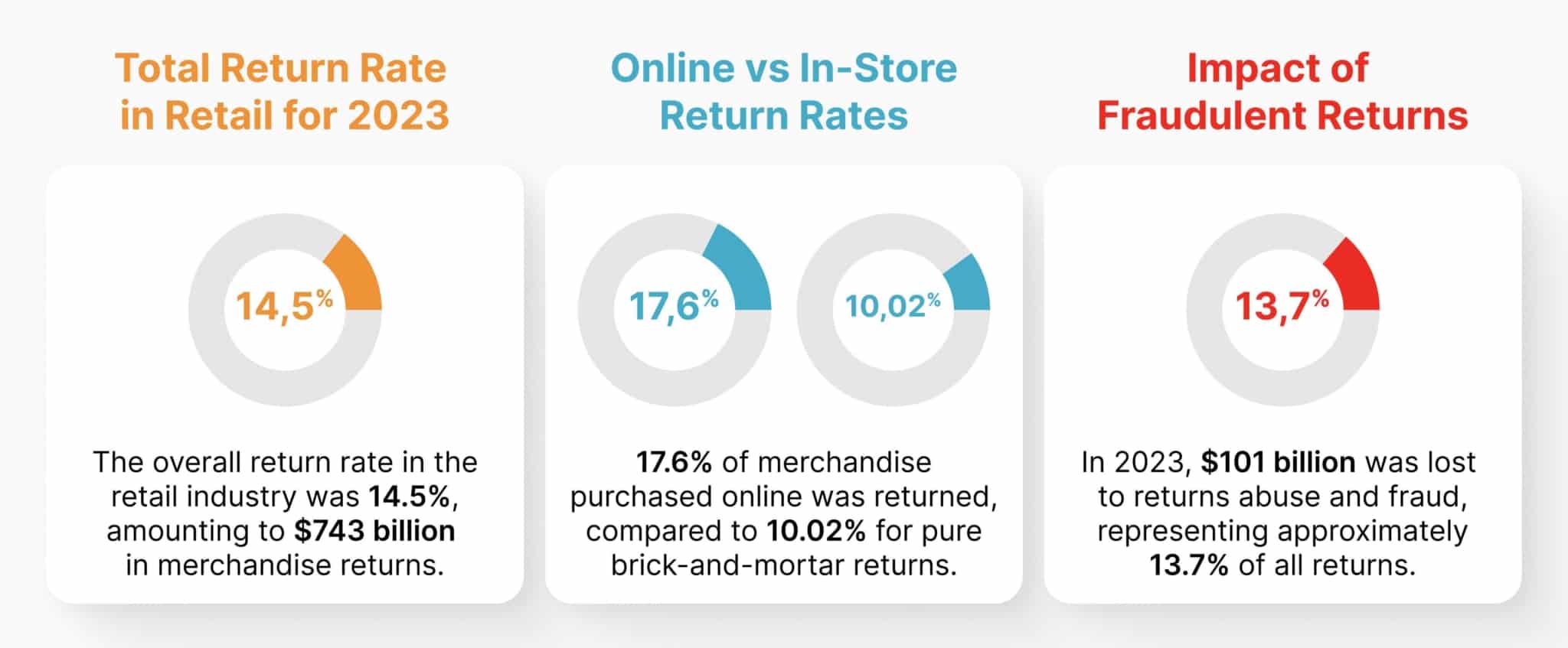The Rising Trend of Online Returns: Challenges and Solutions for Retailers

In the dynamic realm of e-commerce, retailers are forced to navigate a constantly growing surge of online returns. This trend, driven by the widespread adoption of online shopping, brings several challenges that are reshaping the retail landscape. From the challenge of efficiently managing reverse logistics to the financial implications of handling returns, this rise impacts various aspects of your business.
To complicate matters, the simplicity and flexibility of online shopping have led to a notable increase in customer expectations regarding returns. This shift has a profound effect on inventory management, customer relations, and, ultimately, your bottom line.
The Challenges of Online Returns: By the Numbers
Shopping has undergone some considerable changes since the beginning of 2020. With a massive shift toward e-commerce over traditional brick-and-mortar stores, it comes as no surprise that we’re seeing a rise in the number of digital returns.
Here are the most recent stats for Online Returns, according to the National Retail Federation (NRF).
- Total Return Rate in Retail for 2023: The overall return rate in the retail industry was 14.5%, amounting to $743 billion in merchandise returns.
- Online vs In-Store Return Rates: 17.6% of merchandise purchased online was returned, compared to 10.02% for pure brick-and-mortar returns
- Impact of Fraudulent Returns: In 2023, $101 billion was lost to returns abuse and fraud, representing approximately 13.7% of all returns.
These numbers paint a vivid picture of the challenges retailers face in the domain of online returns. When it was all said and done, US companies alone processed $173 billion in returns. As the e-commerce industry continues to evolve, understanding these trends and adapting to them becomes crucial for maintaining customer satisfaction and ensuring business sustainability.

Harnessing Technology to Transform Returns
In the face of these return-related challenges, technology stands out as a beacon of hope. Advanced technological solutions are revolutionizing how retailers manage and process returns, turning a complex challenge into an opportunity for efficiency and customer satisfaction. Here’s how technology is making a difference:
- Returns Management Systems (RMS): Systems like ReverseLogix offer a comprehensive solution for managing returns. RMS can automate the return process & auto-route returns, from initiation to final disposition, making it more efficient and less prone to errors.
This includes automated RMA (Return Merchandise Authorization) generation, real-time status updates for both retailers and customers, and streamlined processing at the warehouse. Furthermore, RMS can be tailored to a retailer’s specific policies and procedures, offering a customizable approach to returns. This not only enhances operational efficiency but also ensures a consistent customer experience. - Data Analytics and Insights: Leveraging data analytics in returns management goes beyond mere number crunching. It’s about gaining actionable insights into why customers return products. Is it due to size issues, product quality, or misleading product descriptions? Understanding these patterns can inform various aspects of a business, from product development to marketing strategies.
Analytics can also predict return trends, helping businesses to proactively manage inventory and resources. This foresight minimizes disruptions and keeps the supply chain agile and responsive.
- Automation in Handling Returns: Automation technologies streamline the return process, reducing the workload on staff and speeding up the return-to-resale cycle. This not only speeds up the process but also reduces the environmental impact by promoting sustainable practices.
Automated systems can also integrate with customer service platforms, providing immediate responses to common queries and freeing up human agents to handle more complex issues.
- Integration with Supply Chain: Effective returns management is not an isolated process; it’s an integral part of the broader supply chain. Integrating RMS with other supply chain components – like inventory management, order fulfillment, and logistics – creates a cohesive ecosystem. This integration allows for the seamless flow of products, information, and resources, enhancing overall supply chain resilience.
This integrated approach also provides end-to-end visibility, making it easier to track products throughout their lifecycle, which is vital for both operational efficiency and customer satisfaction.
- Improving Customer Experience: Technology is a powerful tool for enhancing customer experience in the returns process. AI and machine learning can personalize the returns experience, offering customers options based on their purchase history and preferences.
Chatbots and virtual assistants can guide customers through the return process, answering questions and providing updates in real-time. This not only improves the customer experience but also builds trust and loyalty.
By leveraging technology, businesses can not only manage returns more efficiently but also gain valuable insights to reduce return rates and improve customer satisfaction. The integration of technology in the returns process has become a necessity in the modern retail landscape.
Turning Challenges into Opportunities with ReverseLogix
The evolution of online retail has brought with it a significant increase in customer returns, presenting both challenges and opportunities for businesses. In an era where consumer expectations are higher than ever, efficient management of these returns is crucial. The right approach to returns can enhance customer satisfaction, streamline operations, and contribute positively to a business’s bottom line. Embracing innovative solutions and adapting to changing consumer behaviors are key factors in turning the challenge of returns into a strategic advantage.
Partnering with a solution like ReverseLogix can make a substantial difference. Here are a few general benefits of working with ReverseLogix:
- Streamlined Returns Process: Their system automates and simplifies the returns process, making it more efficient and user-friendly.
- Data-Driven Insights: ReverseLogix provides valuable analytics that help understand return patterns and customer behaviors, enabling more informed decision-making.
- Seamless Integration: It integrates smoothly with existing supply chain operations, ensuring a cohesive approach to returns management.
Incorporating a specialized returns management system like ReverseLogix not only addresses the current needs but also prepares businesses for future shifts in the e-commerce landscape.
